TO THE BEGINNING AND BACK AGAIN
How does one write the Divine?
St John the Divine may have shown us the way in the fourth Gospel with his timeless phrase ‘In the beginning was the Word’ but how do we write the word in a world of seeming unbelief or disregard for formal religion and its trappings. I went along to the Writing The Divine workshop at St Chad’s Parish Church, Rochdale on October 19th to find out.
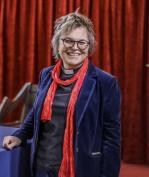
The workshop was run by Canon Rachel Mann as part of the Rochdale Ideas and Literature Festival, extensively previewed here on our all across the arts blog site, and was hosted by the Vicar, the Rev Mark Coleman, fresh from his arrest as part of the Extinction Rebellion demonstration in London.
Canon Rachel had prepared well and started the workshop, attended by a portentous thirteen would-be writers, including three men, not with a prayer but an exhortation to see the session as a series of headlines: -offering a sketch for what might be written in general, and writing in response to the Bible, which in itself is a collection of books and NOT an instruction manual. Therefore writing the Divine depends on how we read and reflect.
One can use the Bible’s stories as a launching to imaginary ideas, such as Rachel’s own poem Joseph and the Angel where Joseph perhaps is in a room full of carpentry tools when the angel comes to ask him ‘Do you understand?. His imagining of boyhood ‘with trees still to be climbed,’ I thought, might beg another question: is the boyhood his own or the Christ’s to come?
Inspiration can come from the Christian liturgical hours or poems of others and Rachel implored everyone to read widely. She read her own Evensong as an example with its introductory quote from 17th century poet Thomas Traherne:
‘Love is a phoenix that will revive its own ashes’. If God is that love his priest sings within ‘walls of stone’ and the narrator cries ‘Hurry on/Witness his truth: / Glory is not a word, God is, God is’.
One can derive words from the Ministry itself and she read her The Ordinal with its reference to ordination and a fitting order of things with the opening lines: ‘I’ve lived for the feeling of others/That’s listening of sorts’, and follows with ‘What have I learnt? That self is bitumen, black as tar’. She has heard that ‘self’ give up its final word in ‘coughs and whispers’ in hospitals and nursing homes but remarks on ‘How slowly we flow, we crack with age’. Listening bears its own philosophy and care goes beyond self.
Rachel Mann is the author of five books and the latest is A Kingdom of Love (Carcanet 2019). It is the latter she used to shape this workshop. She was poet in residence at Manchester Cathedral 2009-2017 and she is now visiting fellow in creative writing and English at Manchester Metropolitan University besides being Rector of St Nicholas’s church, Burnage in Manchester. Her poetry was featured in Carcanet’s New Poetries vol. VII in 2018. So she has form in teaching and guiding. Whilst at Manchester Cathedral she looked at ways of using poetry in church liturgy. She describes herself as ‘Theologian, Feminist and Queer Writer’. She admitted she was orientated to verse rather than prose.
The vicar of St Chad’s also offers poetry readings at civic events and I once read my modernisation of lines from the Book of Lamentations here at a commemoration for the Manchester bombing victims. Rev Mark says he read from the Book of Revelations, or perhaps to give it its more political and Greek name, the Apocalypse, whilst illegally blocking the Queen’s Highway on Lambeth Bridge. However there was no politics at all evident at the workshop- only the Word.
The workshop word was divided into two with all of us asked to write something from the heart as a first interpretation of the gathering and as an unleashing of ideas, something which is not to my taste as it brings out the flippant and anti-social side of me.
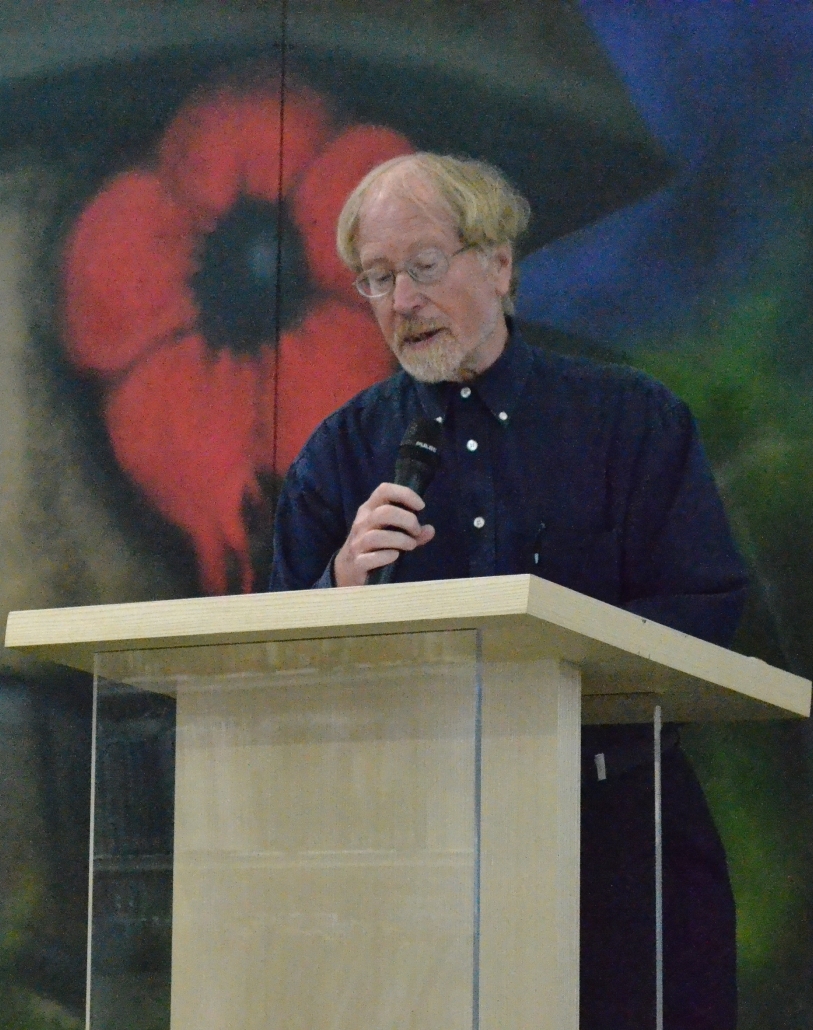
Nevertheless, I managed to write a few lines of poetry attempting to portray the ghostly haunting of a resting church and the awkwardness of forcing one’s thoughts amid a group of strangers. The others seemed to be scribbling furiously, despite a few of them confessing to nerves and shyness and being new to the writing lark. I was surprised at their output however and rather than being a collection of amateurish or hesitant outpourings I found the finished results to be quite mature, ranging from a confident inspiration taken from the talk and readings and from the Bible and past experiences. And some of it was defiantly written in prose! But this was only the beginning and before anyone actually read their pieces Rachel took us through some more poems, mainly her own, and then put photocopies of them on the table for us to ‘beg borrow or steal’ ideas or lines from.
Rachel admitted to physical ailments, hospital treatment and a bleakness of outlook not prone to humour and read from her more personal and enigmatic Give It Name, The Risen Life andfinally A Lesson In Evolution where the use of seaweed to heal abdominal wounds brings to mind that ‘All life was water once/ Perhaps I’ll travel home,/Relearn the tricks of fins, gill and scale’. Consequently we were then asked to edit or amend our first drafts, think anew and wander about the premises for peace and inspiration. I went out into the October sunshine and sought it among the tombs, gravestones and gargoyles of the ancient church itself, ultimately landing at the tomb of the 18th century satirical doggerel and dialect writer John Collier (alias Tim Bobbin), possibly the most famous of the Rochdale area’s literary sons, and returned to my seat in the church to add a bit of irreverent Lancashire dialect to my otherwise dreary lines of verse.
I am not sure what Canon Rachel made of it when I eventually read it out for she seemed taken aback. Happily she rightly praised the offerings of the other twelve who later agreed to form a writing group.
Unfortunately I had to leave before the writing group could be set up but I am told it was. Thanks to Rachel Mann and Vicar Mark the parish church will now have its own writers and readers and I wish them well.
Rochdale may not be the centre of the universe but when one considers what is happening or not happening elsewhere during The Rochdale Literature and Ideas Festival, it becomes so. The evening’s entertainment advertised as Writers Showcase was held at the plain yet grand church of St Mary In The Baum in the centre of a town noted for Gracie Fields nostalgia and its monument to the famed local dialect writers, Edwin Waugh, Margaret Lahee etc., all monuments of the past. That is not to forget, though, Rochdale’s current musical songstress supreme, Lisa Stansfield.
This event showcased local writing groups and poets, unofficially led by ex-mayor and councillor, performance poet and activist Robin Parker and was compered by roving all across the arts journalist Steve Cooke. The tickets were a mere £3 and the fare a widely varied one worth much more, although the starting time of 5:30 pm may have interfered with Sunday Tea for some.
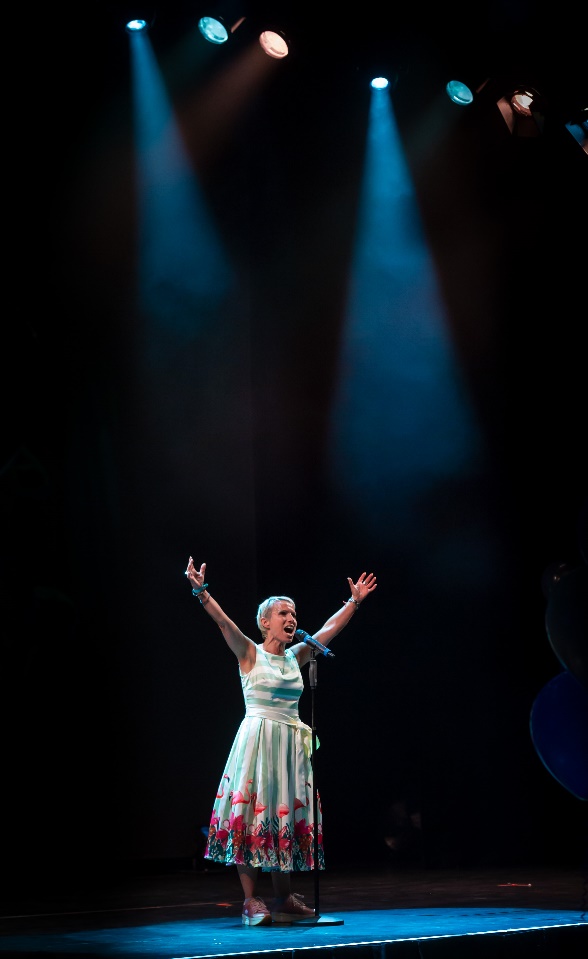
Northern Actress and singer Sue Devaney (photo right) started bang on time with a childhood poem on the theme of the day – Identity – and read her ‘Who Am I’ poem in the voice of her girlhood. Fresh from performances in Blackpool playing in Calendar Girls and with past roles as Gracie Fields herself, not to mention her grounding in Oldham Theatre Workshop, she proclaimed her pride in being a Northerner: ‘not a fool or victim – God hasn’t finished with me yet’. On the theme of being a woman she sang the Edith Piaf standard Je ne Regrette Rien, bolstered by Gracie Field’s whimsical offerings on life and its foibles. Sue was, as they say, ‘on cracking form’.
This hard act to follow was bravely taken up by Touchstone Writing Group’s performance arm, Pulling Threads,* with its series of ‘reminiscences’ and ‘autobiographies’ of victims and witnesses of Peterloo, thus marking the bicentenary of the massacre in a human retelling and a poetic assessment of not only personal but group identity.
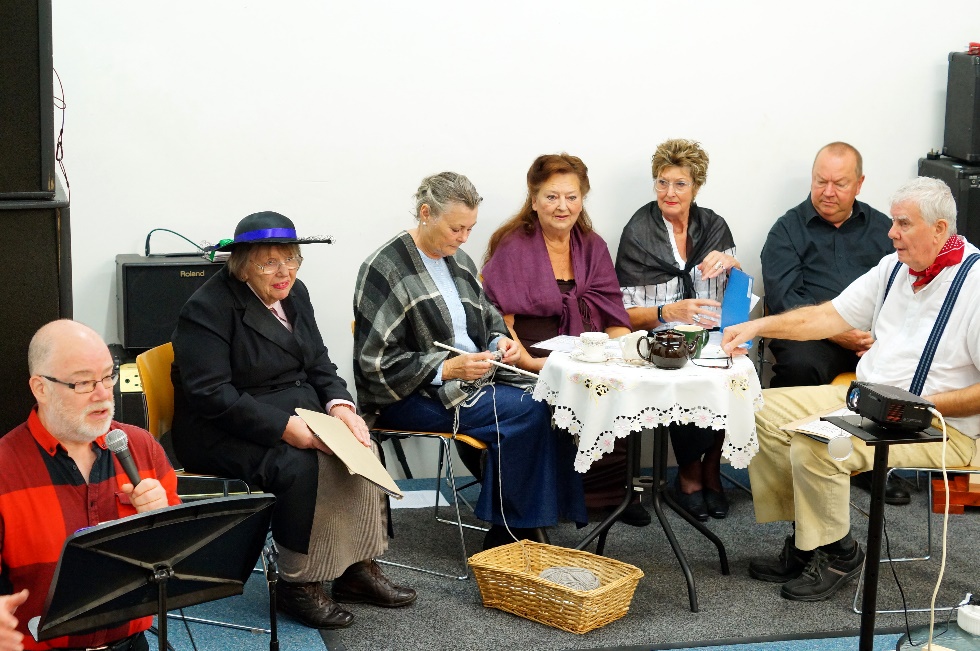
This was a social, rather than a political, depiction yet managed to maintain prosodic and poetic harmony between history and modern class identity. One reader took the part of the editor of a Liverpool newspaper. Another read a poem by Oliver Lomax which describes Peterloo remembrance as ‘the archaeology of the heart’ and imagines a Sex Pistols’ proclamation that ‘we are all the body of John Lees’ (a Peterloo victim). In a nod to Shelley one of the characters Mary Hayes proclaims, ‘We wore the mask of anarchy’ in another crisis of identity. What masks do we wear today? And who is who?
And Identity followed apace with Eileen Earnshaw’s Weaving Words group, begun with Eileen theorising her own identity with a question to one or two members of the audience, one of them being me, on who were we? ‘Rather taken aback I answered, weakly, ‘Just me’. Eileen then offered a tender observation on what I might be. Others wisely did not answer at all. The readers recited poems in their turn on the myriad aspects of identity as being part of the present, past and future, not to mention the ‘might be’ that is in all of us. Are we angels on the way to another world? Part of the Godhead, despite him being depicted as a man? Or, contrarily, an insignificant creature? A creature which has lost its way? Or are we what we make ourselves to be?
In this varied offering which went precariously over time there was a danger of forgetting all about identity and more on audience patience and forbearance but there were some powerful readings of Walt Whitman and Sylvia Plath interwoven to compensate. And ee cummings had his day with the unforgettable line on the complicated soul who ‘sang his didn’t, danced his did’.
Time thankfully catapulted the Langley Writers into a brief but welcome ten minute take-off on the Monty Python Four Yorkshiremen Sketch, transported to growing up on the Langley Estate in Middleton. ‘We used to wash in the sink- You had a sink?’ ‘We used to dream about washing in the sink etc.’. It was a laugh- packed ten minutes indeed following a fast- paced script penned by Robin Parker.
Katie Haigh followed with some of her own poetry and younger members of her family performing as Sign Along With Us. For those who have not seen this family their performance of modern dance and mime, incorporating pop music and sign language is a marvel in itself, brought about as a celebration of life with a younger brother who cannot hear or fully communicate but who can certainly dance and mime. To see the whole family enjoying themselves on stage soon dispels any feeling of exploitation or child manipulation. What you see is what you get – happiness and love – the prime mover of life and identity.
Then came Robin Parker with his moving, and illustrated by film backdrop, High and Mighty poem on his on-going battle as an activist to save his own flat and all the others in the by now iconic ‘Seven Sisters’ blocks in the centre of Rochdale. But he also donned his Sex Pistols tee shirt to perform his punk rock protest song I’m a Pensioner. The theme here is I am growing old but still rebelling. His offering of Existent with the immortal lines ‘I think, I am, I celebrate’ owes more to Monty Python than Descartes. After contemplating a medical diagnosis of man as merely unbalanced or balanced chemicals, he qualifies this with an ending ‘I think therefore I am- I think’. Wrinklies take note.
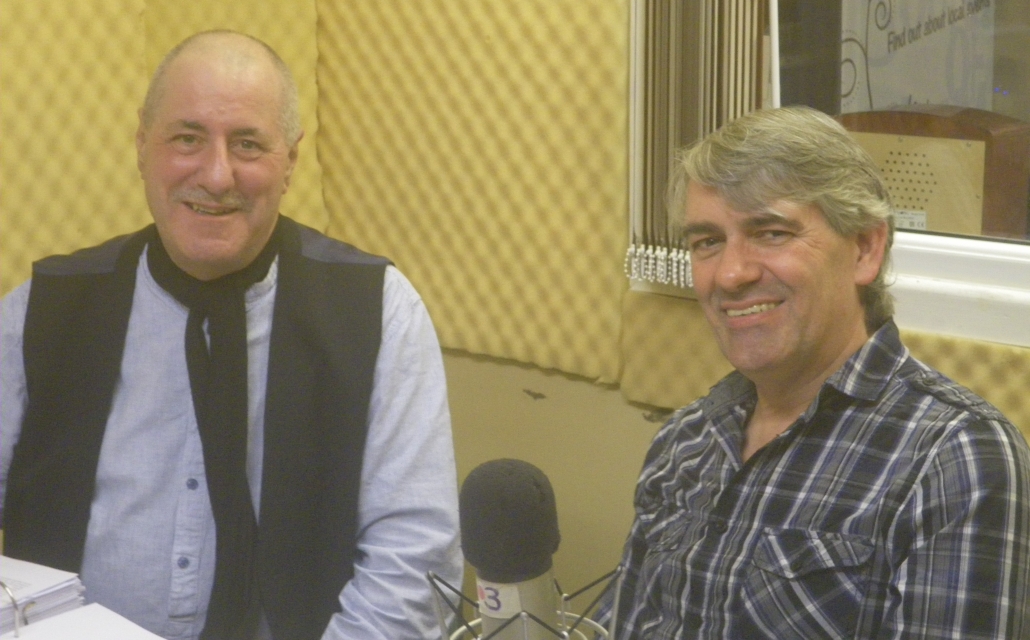
talking to Sidetracks And Detours blogger Norman Warwick (left)
It fell to poet Seamus Kelly to end the evening with voices from the dark as he moved from the shadows and lamp-lit columns of the evocative nave of the silent church. ‘Every word binds your soul to this, are you ready to show your souls?’ Seamus’s poems are deep yet rhythmic and full of surface ripples, revealing his love for nature and anger at despoliation and senseless exploitation. He had nothing but praise for the Vicar of Rochdale who was recently arrested at the Extinction Rebellion protest in London. However, his work also shows a light hearted look at immigration controversies with his poem Les mots differents lampooning foreign word in general and particular foreign words seeping into the language: ‘foreign words immigrating without permission’.
I am not sure what the deeper meaning of his I Like Bicycles, is but it was an extremely light touch with which to end proceedings which had taken up three hours of the Sabbath where a celebratory Evensong might once have broken the silence of the tomb-like church building.
However we otherwise identify ourselves in our confusing day-to-day lives we had tonight come together as audience and performer in a unique event that showed Rochdale literary and musical talent in an unequalled atmospheric setting.
Time waits for no man. Bring on next year.
- Editor´s notes
Thanks Michael for this comprehensive and far reaching report.
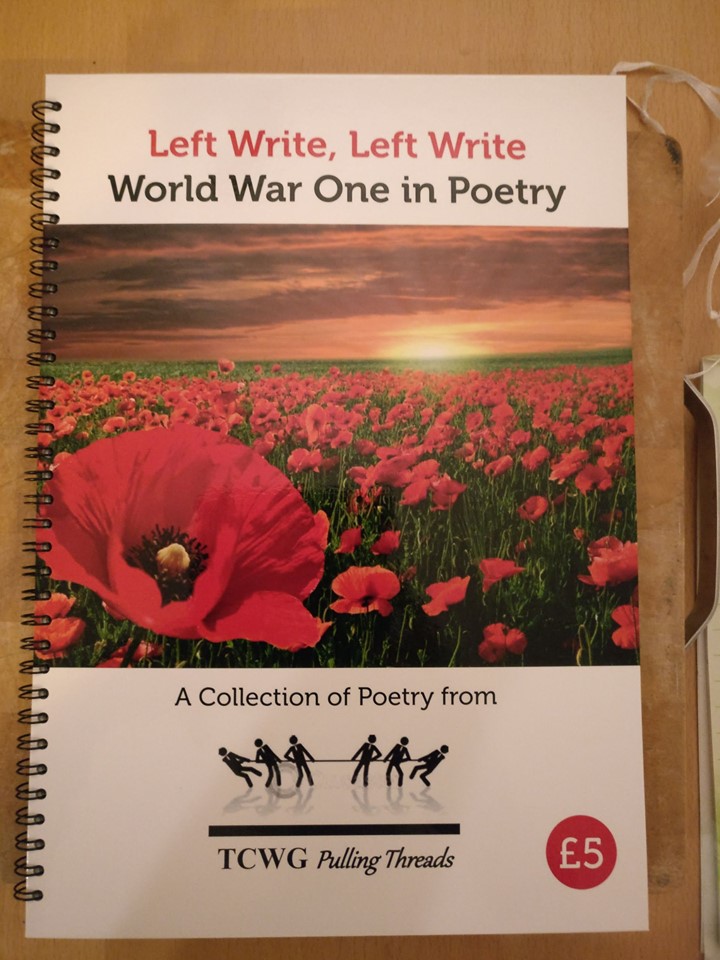
- Readers please note that that Left Write, Left Write is a collection of poetry written and collated by members of Touchstones Creative Writing Group during the four year centenary commemoration of World War One. During this period the Pulling Threads performance arm of the group has delivered several performances of drama and poetry. The well-produced book is available now and you can find further details on www.touchstonescreativewritinggroup.com




Leave a Reply
Want to join the discussion?Feel free to contribute!